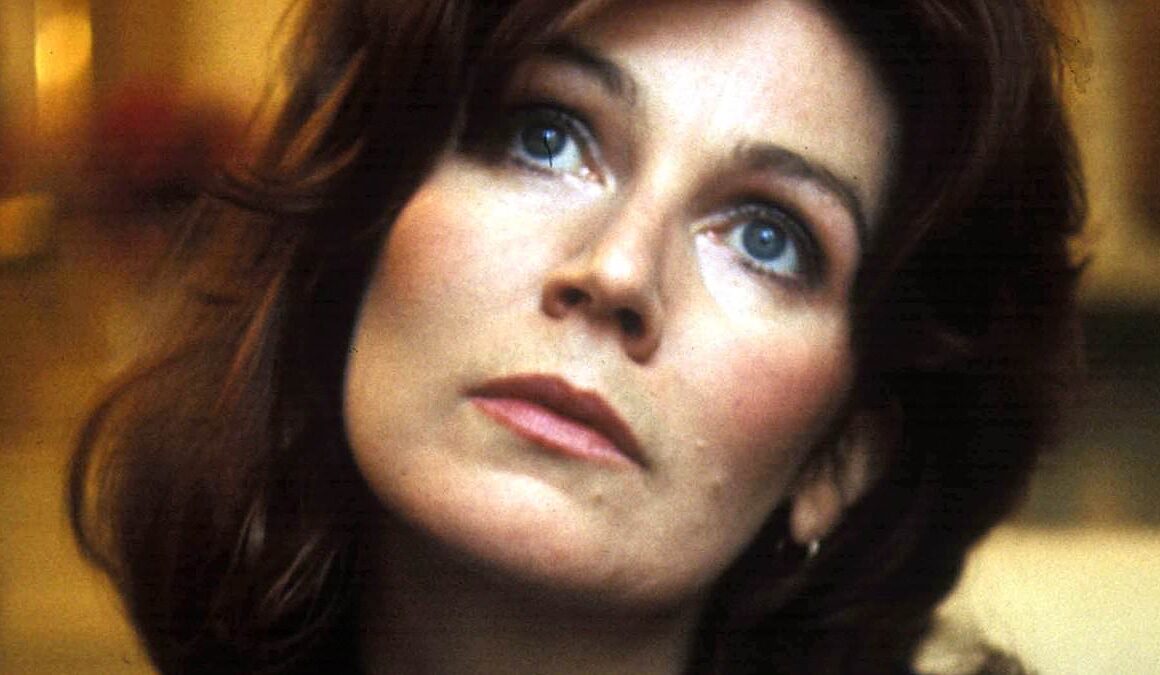With her tumbling auburn hair, green eyes, alabaster skin and seductive Irish brogue, Edna O’Brien was as glamorous as any of the women whose lives filled the pages of her best-selling novels.
But there was one critical difference: a delicious aura of scandal and intrigue clung to the writer, who has died at the age of 93.
Right up until old age she remained a spell-binding femme fatale about whom men, captivated by her beauty, were inclined to tell tall tales.
For women, she was celebrated not just for the vividness of her prose but also for challenging conventions about their role – and particularly about sex.
She gained instant fame – and notoriety – with her acclaimed coming-of-age story in 1960, The Country Girls, whose fearless honesty and casual ribaldry enchanted reviewers but scandalised Catholic Ireland, where it was banned by the censor for its sexually explicit content.

Irish novelist Edna O’Brien has died at the age of 93. For women, Edna was celebrated not just for the vividness of her prose but also for challenging conventions about their role and sex

Right up until old age she remained a spell-binding femme fatale about whom men, captivated by her beauty, were inclined to tell tall tales, writes Richard Kay
The Archbishop of Ireland condemned it and government ministers decreed that it had no place on the bookshelves of any ‘right‑thinking family.’
Other critics went further. In her hometown, the local postmistress thundered that the author of such filth should be kicked naked through the streets, and bootleg copies were ceremonially burned. ‘The parish priest rounded them up, plus their owners… and they burned these three copies in the garden or grounds of the church,’ she recalled. ‘My mother reported to me… that several women fainted.’
Only later did O’Brien discover that her deeply religious mother had hidden her own copy after blotting out any offending words with black ink.
The book, which she famously wrote in just three weeks, transformed the life of O’Brien, who had left school to work behind the counter of a chemist.
In London she became an overnight literary success, but in her native Ireland she was considered a national pariah.
Yet the moral hysteria that greeted the book’s appearance has ensured that both it and its writer became era-defining symbols of the struggle to liberalise Ireland’s ultra-conservative and institutionally misogynistic post-war society.
Her career spanned more than 60 years, with her final novel, Girl, published in 2019. And as celebrated as she was for the courage and elegance of her writing, she was as well-known for her love life. In a memoir released in 2012 she told how she lost her virginity to a handsome newspaperman while training as a pharmacist in Dublin and moved in with her husband-to-be, who inconveniently was married to someone else, six weeks after meeting him.
Her marriage did not survive her success and she was forced into a long and bitter custody battle for their two sons.
She famously had affairs with the Hollywood star Robert Mitchum and the singer Bryan Ferry, but she turned down a bemused Richard Burton. ‘He could not understand why I did not want to go to the bed chamber,’ she said.
She had no such qualms about tough-guy actor Mitchum, whose chat-up line to the luminously attractive O’Brien was: ‘I bet you wish I was Robert Taylor and I bet you have never tasted white peaches.’ As the then 81-year-old Edna wrote of their first meeting: ‘It was clear he was going to take me home, regardless of my situation.’
Sure enough, he nodded across the room to her and said ‘Let’s go baby’, and they went home to O’Brien’s small house in Putney. There, she recalled, ‘we danced all way up the stairs into the tiny bedroom… with all the shyness of besotted strangers in syrupy songs’.
There was an affair with the former Labour MP, U.S. ambassador and TV presenter John Freeman, whose other extra-marital conquests included the 1960s Cabinet minister Barbara Castle – like O’Brien a fiery redhead.
Stung by the ending of their relationship, she got her own back with her 1968 short story The Love Object. The object in question was a very thinly disguised Freeman, who conducted the BBC’s Face to Face interviews. In it, she wrote how he announced ‘jocularly’ that their affair should end while they were making love.
She also cuttingly observed that the Freeman character always folded his trousers with geometric precision before jumping into bed.
He was not the only prominent political grandee with whom O’Brien was linked, and although she never revealed his name – he was also married – she did once come close.
Relating how she had been at a cocktail party at the American ambassador’s residence in Regent’s Park, she recalled how she had been mistaken for a cloakroom attendant before adding: ‘And then a man I had once loved, who has to be nameless, cut me dead.’
Their long-standing attachment was conducted during the 1980s.
Not all her encounters ended in romance. At the height of her beauty she was jilted by the U.S. folk singer Richie Havens, who famously opened the Woodstock rock festival in 1969. All he left her with was an enigmatic note.
In a radio interview with pop star Jarvis Cocker, O’Brien revealed how she had met Havens at a party. ‘He took a little bit of a shine to me,’ she recalled. ‘I get rather excited if I admire someone so, in short, it is not a secret.
‘He invited me to meet him the next evening at this hotel by Hyde Park Corner.
‘I went to the hotel and the concierge handed me a letter which is engraved in my mind. It was one of life’s jiltings.
‘It said: ‘I cannot be here. I have made two promises both to transpire on the same mountain.’ In short, I never saw Richie Havens again.’

Edna famously had an affair with singer Bryan Ferry…

…and Hollywood star Robert Mitchum
Even into her late 70s and 80s, O’Brien, who received an honorary damehood for her contribution to literature, exuded a flirtatiousness that many admirers found irresistible.
Her bohemian house parties were famous for the celebrities who attended – Sean Connery, Michael Caine, Princess Margaret, Marianne Faithfull and Paul McCartney who wrote a song for her. Marlon Brando stayed the night, though she always insisted the encounter was chastely innocent.
But if, like her literary hero James Joyce, Edna O’Brien had to exile herself to find her identity as a writer, her spirit never left Ireland. In her memoir, titled Country Girl, she described herself as a woman of two sides – bold and enterprising on the one hand, sensitive and vulnerable on the other.
As the critics said, this sense of human frailty and her lucid style, made the more than two dozen novels, short stories, poetry, screenplays and memoirs so compelling.
The youngest of four children, Edna O’Brien was born into a strongly Catholic family in County Clare and she never lost her west of Ireland accent.
Her father was a drunk and inveterate gambler, and she grew up in fear of his alcoholic rages. She recalled him accusing her mother of hiding money he wanted for drink. Waving a revolver in the face of his wife and child he vowed ‘havoc and slaughter on all of us’.
Implored by his wife to put the gun down, he instead fired it. ‘I thought we were dead and found it strange to be smothered in burning smoke,’ Edna recalled. ‘The bullet missed us and passed into the frame of the door where white paint was crumbling and falling off in little shards.’
From her mother there was extreme religious devotion. ‘There were morning prayers, evening prayers, vespers, supplications and contritions, psalms and versicles,’ Edna noted.
‘There were exhortations about pride, vanity, filthy pleasures, the deformity of our sins… the flames of Hell seemed as real as the turf burning in the fire.’
Her mother, she said, demanded that her children be spotless. ‘And not just outside, but our souls, too.’
‘Whereas my father never held grudges, she could be very judgemental. Growing up, falling in love, sexual desire – she was against all that.’
To escape this harrowing upbringing, she sought refuge in the countryside, to daydream and write imaginary stories in which, she later said, ‘the words ran away with me’.
After leaving school she moved to Dublin to train as a pharmacist, though her spare time was spent searching out the city’s bookstores. It was there she met Ernest Gebler, a failed Irish-Czech writer 20 years her senior with whom she promptly fell in love.
On learning of his daughter’s ‘transgressions’, her father arrived at Gebler’s house, accompanied by a monk, determined to retrieve Edna and ‘put her away’.
The couple fled to the Isle of Man where they took refuge with the writer J. P. Donleavy, only for her father and the monastic sidekick to follow. Donleavy broke up the ensuing brawl and her father returned, without her, to Ireland.
In 1952, the couple married and settled in London where they raised two sons, Sasha and Carlo.
The marriage, however, did not survive. O’Brien realised she had exchanged the restrictions of her religious upbringing for an equally harsh domestic regime. Gebler was jealous of his wife’s literary abilities. When The Country Girls was published, for which she was paid £50, he glowered: ‘You can write, and I will never forgive you.’
The book detailed the adventures of two girls from a rural background who move to Dublin looking for romance. Both characters were based on her, and it was a huge hit. Soon after O’Brien walked out. Her husband dubbed her a ‘vainglorious monster, divested of all human traits’. It took her three years to gain custody of her sons.
She, meanwhile, reinvented herself as a hostess of the by then swinging London and mingled with glamorous literary figures both there and in New York where her circle included Jackie Kennedy, Norman Mailer, Gore Vidal and R. D. Laing, the psychiatrist with whom she took LSD and suffered a terrifying ‘trip.’
It propelled her into a prolonged, chemically-induced breakdown. ‘I was rooted, incapable,’ she said. But there was a good side-effect: the bad trip cured her of a tendency to fall in love with cruel, authoritarian men.
Although she never married again, she admitted having a weakness for unsuitable men.
Her ideal date, she said, was to ‘go out with the man I love, who bought me champagne, who didn’t complain about the price… and didn’t tell me how much he loved his wife.’








